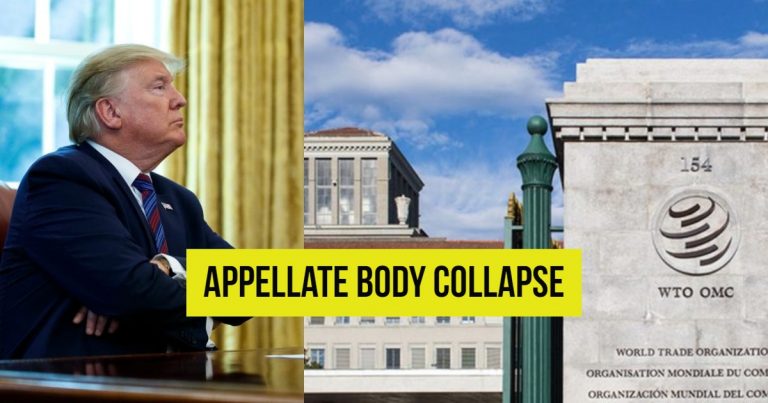For the first time since its inception the World Trade Organization (WTO) is facing its existential crisis like never before. With their persistent attempt to sabotage the WTO, stalemate created by the United States in blocking appointment of the members of Appellate Body (akin to the Supreme Court of trade) have finally resulted in collapse of dispute settlement at the WTO. The apex body i.e. Appellate Body (AB) for settling trade disputes now is left with only one member (coincidentally from China) which alone can’t decide the disputes against the appeal from panel rulings due to lack of quorum. This has led to a peculiar situation where member countries of the WTO have the right to appeal against panel rulings but ironically their appellate forum itself has collapsed. Global economy is already into the shambles and there seems to be no respite for member countries of the WTO who are now in a situation that can be aptly put as “having rights without the remedies”.
Concerns of United States & its Tryst with the WTO Dispute Settlement
In WTO decisions are usually taken by consensus among the member countries. Even a single member country can use their veto power and can stall the decisions. The present crisis is borne out of United States repeatedly vetoing the initiation of process of nominating and appointing the members of the Appellate Body over various issues. Before I proceed further it is imperative to look at the concerns which US have raised. They claim that Appellate Body over steps its mandate given in the Dispute Settlement Understanding. Some of the key concerns which US has raised is the failure of Appellate Body to issue reports within 90 days, AB is issuing dicta, making findings on facts rather than law, asserting its reports to serve as precedent. While the communications, amendments and proposals from various countries tries to address the concerns which the United States have raised but US still seems to be dissatisfied. Despite its criticism of the WTO dispute settlement process US have successfully wielded their trade distorting measures against the countries since the inception of WTO. There is nothing new in complains by the United States when the decision goes against them but at the same time they are very complimentary and shows support when the outcome is in their favour. However, at this juncture countries must not be under the blind impression that US doesn’t want to have WTO. For United States the question of dispute settlement fairness typically revolves around its outcome (they have been constantly crying foul on EC-Bed Linen and other case curbing their practice of Zeroing). United States might have played this trump card to stall the appointment of Appellate Body members so that the countries across the globe get succumbed to the pressure and in turn they get their interest satiated. In fact when we look at the statistics it shows that United States itself has been one of the most active users of the WTO dispute settlement system.
Crisis at WTO is the Crisis for World
The existing conundrum is much beyond the mere appointment of Appellate Body members rather it requires a serious introspection from the members of the WTO. Trade is often referred to as “Engine of Growth” and formation of WTO have facilitated the economic integration of various developing countries and the LDC’s in the global economic order. A joint report outlines the importance of trade in poverty alleviation. Importance and efficacy of the WTO Dispute Settlement Mechanism is clearly evident from its successful adjudication upon more than 500 disputes within a very short span of less than 25 years and it has rightly been hailed as the “Crown Jewel” of the WTO.
It is the beauty of WTO dispute settlement mechanism where LDC’s and developing countries have won cases against the powerful economies by successfully challenging their trade measures which are against or is inconsistent with the global trading norms. India too has been one of the most active users of WTO dispute settlement mechanism. It has successfully challenged and protected its interest by winning some of the disputes against developed countries like European Union and the United States.A possible way forward will be to definitely address the concerns which the United States have raised but, at the same time countries must bear in mind nothing should be agreed at the cost of interests of developing and LDC’s which deprives them to remain on an equal footing with the other economies of the world. Any such measure which ignores the concern of developing countries and the LDC’s then it would be nothing less than a stymied on the Agreement establishing the WTO i.e. Marrakesh Agreement itself which recognizes the need for developing and the least developed countries to secure a share of growth in international trade that commensurate with the need for their economic development.
Conclusion
United States in the recent past have taken exit from various global convention and institutions but that doesn’t mean those ceases to be of any importance to the rest of the world. Meteoric rise in international trade have led to paradigm shift in global trade architecture and we are witnessing significant rise in Regional Trade Agreements. Countries across the globe must not undermine the institution of WTO and put cohesive efforts to ensure that multilateral trading system continues to flourish with or without the United States. The global community must also understand the fact that delay to resolve the issue shall have dire consequences and the proposals to include new areas of trade and having a robust rule based multilateral trade regime shall forever remain a deferred dream. It is for all of us to wait and watch how the current impasse gets resolved and where does the fate of one of the finest global institution lies.
Abhishek Ranjan[1] & Dr. Puranjoy Ghosh[2] are the author of this article. They bring their finest expetise on the subject to the readers.
[1] Law Graduate presently working as a Research Associate at Department of Commerce, Ministry of Commerce and Industry, Govt. of India
[2] Assistant Professor, School of Law, KIIT University, Bhubaneswar



